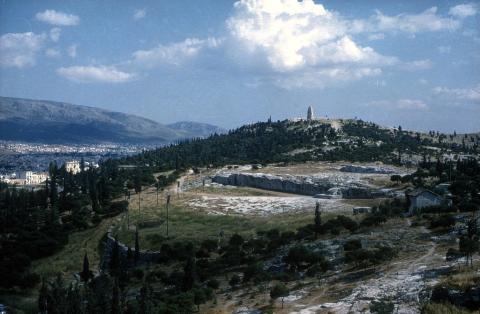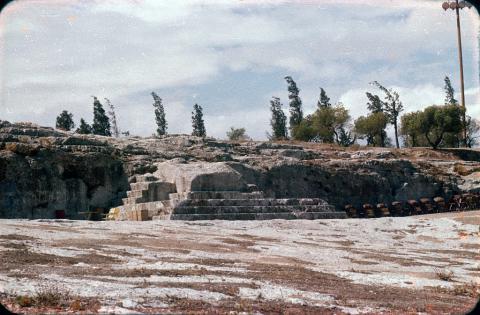Apollodoros explains the steps by which Athenians grant the exceptional honor of citizenship.
88
ἐξόν < ἔξεστι; accusative absolute (G. 591, S. 2076). Another example is found in section 13.
δῶρον: take this word, along with its modifiers (καλὸν καὶ σεμνόν), as the predicate.
τὸ Ἀθηναῖον γενέσθαι: articular infinitive: “to become Athenian” means “to become a naturalized Athenian citizen.”
ποιεῖσθαι < ποιέομαι (middle of ποιέω), which often means “to adopt”; in a transferred sense it can mean to “adopt” someone into one’s polis, i.e., naturalize them.
πολίτην: take as the predicate; the object of ποιεῖσθαι is τινά.
89
ὅμως: some scholars think that there is a lacuna preceding ὅμως (proposing that something like “even though you know these laws…” has fallen out); others use the emendation ὑμεῖς δ’ ἀκούσαντες αὐτῶν βέλτιον εἴσεσθε (as does Dilts 2009).
αὐτῶν: genitive object of ἀκούοντες.
βελτίους = βελτίονες (comparative of ἀγαθός).
βελτίους ἔσεσθε: it has been pointed out that this is a patronizing way of speaking to the jury (Carey 1992: 130); Kapparis 1999: 88 therefore suggests emending the text to βέλτιον εἴσεσθε.
τὰ κάλλιστα καὶ τὰ σεμνότατα δῶρα: take as the object of λελυμασμένοι εἰσίν.
πόλιν: object of εὐεργετοῦσι. Euergetism, doing good services for the polis of Athens, was something that was highly encouraged and rewarded in kind.
λελυμασμένοι εἰσίν: perfect middle < λυμαίνω (“soil, dishonor, outrage, offend”), periphrastic as usual for 3 pl. pf. mid.-pass. (see §48 and S. 408); the subject is Stephanos and others of his ilk.
ἀνδραγαθίαν εἰς “good services to,” see §73; ἀνδραγαθία, literally “the quality of being a good man,” was the defining virtue that qualified one for naturalization.
κυρίαν “valid.”
ἐπιοῦσαν < ἔπειμι (ἐπί + εἶμι); that is, the next Assembly meeting.
ὑπερεξακισχίλιοι: over 6,000: the typical number required for quorum.
ψηφίσωνται: this is the second vote to ratify the grant of citizenship; the first took place at the previous Assembly meeting. The additional requirement of a second vote is hard to date precisely.
κρύβδην: the use of secret ballots and urns (see below) is more typical of the courts than the Assembly.
90
γέρρα: these are likely movable wicker fences. A plausible suggestion (Hansen 1984: 241–47) is that they were temporary barriers set up to monitor access to the Pnyx. Only citizens were let through at first, so that they could vote; after the vote, the barriers were taken down and non-citizens (and other spectators) could come through to witness the proceedings.
κύριος ὢν αὐτὸς αὑτοῦ “being himself master of himself,” i.e., independent and free from any pressure brought by non-citizens
σκοπῆται πρὸς αὑτόν: the prepositional phrase, to be taken closely with the verb, intensifies the idea of introspection.
λήψεσθαι: deponent future of λαμβάνω: supply as its object δωρεάν (that is, the gift of citizenship).
παρανόμων γραφήν “an indictment for illegality,” see §5.
ἐποίησε: “(the law) made it possible (to bring).”
κατ’ αὐτοῦ: i.e., against the candidate for citizenship. Technically, however, the γραφή is brought not against him but against the man who proposed that said person be given citizenship.
ἔστιν: note the accent: here with its sense of “it is possible”; it can take a dative or (as here) accusative of person for whom something is possible, plus infinitive.


